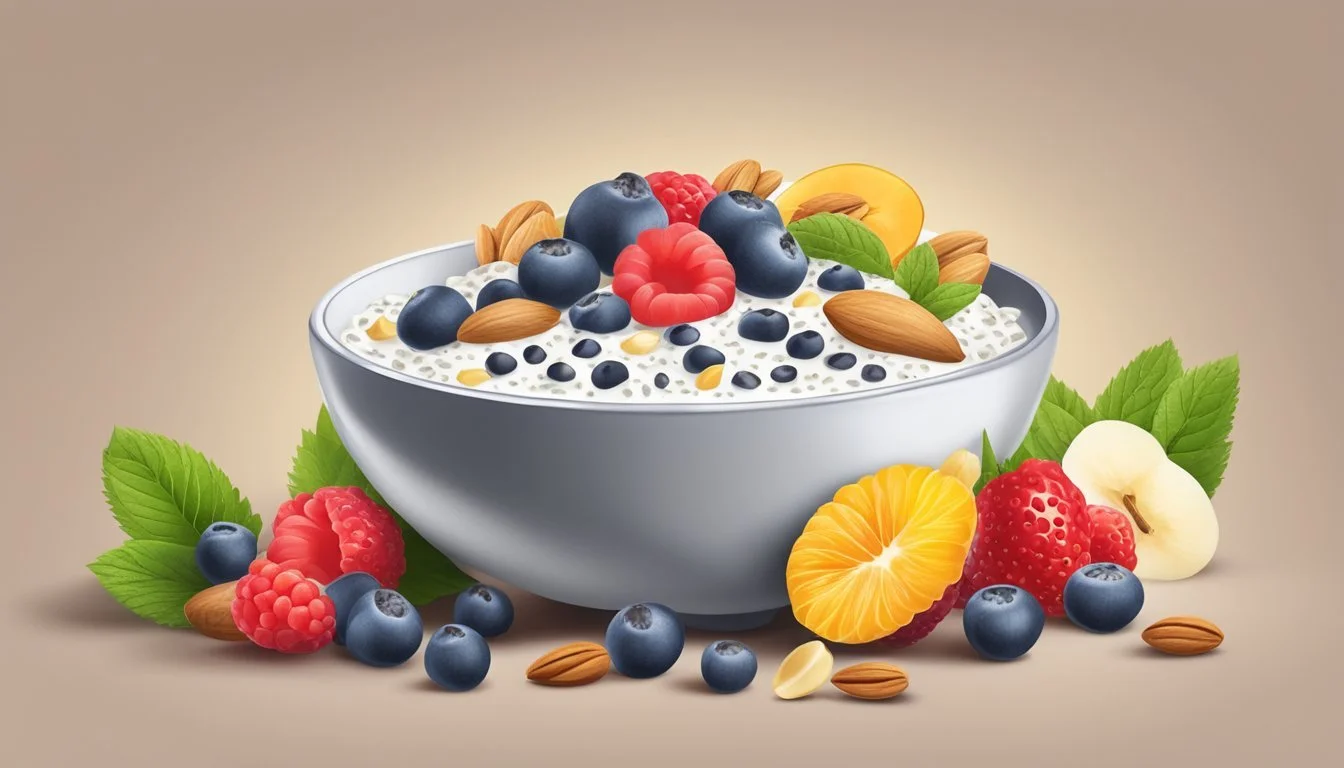10 High-Fat Foods
Essential Sources for Your Diet
Exploring foods high in fat is crucial for understanding both the benefits and potential drawbacks they bring to our diets. In recent years, fats have seen a resurgence in popularity, especially considering their essential roles in promoting overall health and well-being. Many people often wonder which high-fat foods are actually beneficial for their health and how these foods can be incorporated into a balanced diet.
This article aims to provide a comprehensive guide on high-fat foods, shedding light on the different types of fats and their sources. With a mix of nutritious options and some that should be consumed sparingly, readers will gain clarity on how to make informed dietary choices that support a healthy lifestyle.
1) Avocado
Avocados are a unique fruit known for their high-fat content. A typical serving size, which is half an avocado or 100 grams, contains approximately 14.7 grams of fat. This makes them one of the richest plant sources of fat.
The fat in avocados is predominantly monounsaturated, primarily oleic acid. Monounsaturated fats are known for their heart-healthy benefits, which include reducing bad cholesterol levels.
In addition to their fat content, avocados offer other nutritional benefits. They are rich in magnesium, potassium, vitamin C, vitamin E, and vitamin K. These nutrients are essential for maintaining various bodily functions and overall health.
Avocados also contain a small amount of protein and carbohydrates. Specifically, one-half of an avocado provides 2 grams of protein and 8.5 grams of carbohydrates.
Despite their higher calorie count, avocados can be beneficial for weight management. Their fiber and healthy fat content can promote a feeling of fullness, potentially reducing overall calorie intake.
2) Cheese
Cheese is a popular food item worldwide, known for its rich flavor and creamy texture. It comes in many varieties, each with unique nutritional profiles.
Mozzarella, a soft white cheese, contains high moisture and is generally lower in fat compared to harder cheeses. Cottage cheese, another variety, is praised for its high protein content and relatively low fat.
On the higher fat end, cheeses like cheddar, brie, and blue cheese are notable. Cheddar is a hard cheese that is rich in fats and calories, making it a dense energy source. Brie, a soft cheese, also contains significant fat content, contributing to its creamy consistency.
Blue cheese, characterized by its distinct flavor and mold veins, is similarly high in fats. While these cheeses are nutrient-dense, they can also be high in saturated fats and cholesterol.
Despite their fat content, many cheeses are excellent sources of protein and calcium. They provide essential vitamins and minerals that contribute to overall health. Moderate consumption in a balanced diet can offer these health benefits without excessive intake of fats.
Selecting lower-fat options or controlling portion sizes can help mitigate the high-fat content in cheeses. Choices like low-fat mozzarella or reduced-fat cottage cheese can be good alternatives.
3) Dark Chocolate
Dark chocolate is a popular treat known for its rich flavor and high cocoa content. It is also a food high in fat. A 101-gram bar of dark chocolate with 70-85% cocoa solids contains approximately 43 grams of fat. This makes it a significant source of dietary fat.
Despite its high fat content, dark chocolate provides several nutrients. For instance, a one-quarter cup serving, around 1.5 ounces or two large squares, contains 13 grams of fat and 220 calories. Additionally, dark chocolate supplies protein and carbohydrates.
The type of fat in dark chocolate includes both saturated and unsaturated fats. While consuming fats in moderation is essential, the fats in dark chocolate can provide energy and support various bodily functions. However, it is important to consume dark chocolate in moderation due to its high calorie and fat content.
Dark chocolate also has potential health benefits, attributed to its high cocoa content. It contains antioxidants, which can support heart health and reduce inflammation. However, it is best to choose dark chocolate with a high percentage of cocoa solids to maximize these benefits.
4) Whole Eggs
Whole eggs are often considered a nutritional powerhouse. A single large egg typically contains about 78 calories. They provide 5 grams of fat, which is largely distributed in the yolk.
The fat in eggs includes monounsaturated and polyunsaturated fats, which are beneficial for heart health. These fats can help maintain healthy cholesterol levels and support overall well-being.
In addition to fats, eggs are rich in protein. One large egg contains approximately 6 grams of high-quality protein, essential for muscle repair and growth.
Whole eggs are also a good source of several vitamins and minerals. They contain significant amounts of vitamins A, D, E, and B6, along with minerals like iron, selenium, calcium, and zinc.
Choline, present in eggs, supports brain function, making them a beneficial addition to the diet. Eggs are versatile and can be incorporated into various meals, making them an easily accessible source of healthy fats and nutrients.
5) Fatty Fish
Fatty fish are an excellent source of healthy fats. These types of fish provide a rich amount of omega-3 fatty acids, which are beneficial for heart health. Popular varieties include salmon, mackerel, and sardines.
Salmon is particularly celebrated for its high omega-3 content. A 100-gram serving of salmon offers a significant dose of these essential fatty acids. Mackerel, another fatty fish, provides similar benefits and is also a good source of protein and vitamins.
Sardines, often available canned, are small but packed with nutrients. They provide high amounts of omega-3s and are also rich in selenium and vitamin B12. Including sardines in a diet can be an easy way to boost one's intake of healthy fats.
Tuna, especially bluefin and albacore varieties, is another excellent choice. It provides omega-3s and is versatile enough to be used in various dishes. Albacore tuna, in particular, has a favorable omega-3 to omega-6 ratio, making it a heart-healthy option.
Overall, including fatty fish in one’s diet can provide numerous health benefits. These fish are not only high in beneficial fats but also offer valuable vitamins and minerals necessary for maintaining good health.
6) Chia Seeds
Chia seeds are known for their high content of healthy fats, with around 8.7 grams of fat in a 1-ounce serving. Of this fat, about 60% consists of omega-3 fatty acids, which are beneficial for heart health. These fats help to lower cholesterol and regulate heart rhythms.
Aside from their fat content, chia seeds are also rich in protein and fiber. A 1-ounce serving provides approximately 4 grams of protein and 11 grams of fiber. This combination can promote a feeling of fullness, which might help in weight management.
Chia seeds contain essential minerals such as calcium, phosphorus, and zinc. Two tablespoons provide about 18% of the recommended daily allowance for calcium, which supports bone health.
The mild flavor of chia seeds makes them easy to incorporate into various dishes. One popular use is making chia pudding. When mixed with liquid, chia seeds form a gelatinous coating, creating a pudding-like consistency.
In addition to their nutritional benefits, chia seeds have been studied for their potential in reducing oxidative stress and inflammation. This has implications for reducing risk factors associated with cardiac diseases.
7) Coconuts
Coconuts are notable for their high fat content. They contain approximately 15 grams of fat per 45 grams of fresh coconut meat. This makes them a dense and energy-rich food.
The majority of the fat in coconuts comes from saturated fat. Specifically, they are rich in medium-chain triglycerides (MCTs).
MCTs are unique because they are rapidly absorbed by the liver and used for quick energy.
Coconuts are also a good source of fiber, contributing to digestive health. Their antioxidants aid in protecting cells from damage.
In addition to MCTs and antioxidants, coconuts provide essential minerals like potassium, manganese, and selenium. These nutrients support various bodily functions and overall well-being.
Despite their high saturated fat content, some research suggests that the MCTs in coconuts may help raise beneficial HDL cholesterol levels. This highlights their potentially favorable impact on heart health.
Care should be taken, though, due to the high calorie and fat content. Moderate consumption is recommended to avoid excessive calorie intake while enjoying the nutritional benefits of coconuts.
8) Extra Virgin Olive Oil
Extra virgin olive oil (EVOO) is a staple in many kitchens due to its rich flavor and nutritional benefits. It is high in monounsaturated fats, which are linked to better heart health. This type of fat can help reduce bad cholesterol levels and has anti-inflammatory properties.
EVOO contains about 119 calories per tablespoon. Despite its high caloric content, moderate consumption can be part of a healthy diet. It is an excellent source of antioxidants which fight free radicals in the body.
Incorporating EVOO into daily meals is easy. Use it to sauté vegetables, dress salads, or dip bread. Its versatility makes it simple to integrate without overhauling dietary habits.
Additionally, EVOO is beneficial beyond cooking. It can be used in skin care routines due to its moisturizing properties. Apply it directly to the skin to help retain moisture and provide nourishment.
EVOO also plays a role in preventing immune-inflammatory diseases. Regular consumption is associated with reduced risks for conditions like cardiovascular disease, certain cancers, and diabetes. Its health benefits make it more than just a cooking ingredient.
In conclusion, extra virgin olive oil is a valuable addition to any diet, offering a blend of flavor and health benefits.
9) Full-Fat Yogurt
Full-fat yogurt is a rich source of essential nutrients. It contains a variety of vitamins and minerals like calcium, vitamin B12, and riboflavin. These nutrients are important for maintaining bone health, energy production, and overall bodily functions.
Full-fat yogurt has a higher fat content compared to its low-fat or non-fat counterparts. The fat in full-fat yogurt is predominantly saturated, but it also contains beneficial monounsaturated fats.
Protein is another important component of full-fat yogurt. It helps in muscle repair, growth, and can promote a feeling of fullness. This can be beneficial for those looking to manage their weight.
Another advantage of full-fat yogurt is its probiotic content. Probiotics are live bacteria that can improve gut health. They aid in digestion and can boost the immune system.
When choosing full-fat yogurt, it is important to read the label. Look for options with minimal added sugars and artificial ingredients to gain the most nutritional benefits.
Incorporating full-fat yogurt into a balanced diet can contribute to better overall health.
10) Macadamia Nuts
Macadamia nuts are known for their rich and buttery flavor. These nuts are particularly high in healthy fats, which include monounsaturated fats. One ounce, or about 10-12 kernels, contains approximately 21.5 grams of fat. This makes them a dense source of energy.
They are also packed with essential nutrients. Macadamia nuts provide a substantial amount of vitamins and minerals. Calcium, magnesium, and potassium are present in significant levels, contributing to bone health.
With a low carbohydrate content, macadamia nuts can be beneficial for those monitoring their blood sugar. They are also high in fiber, which supports digestive health and can help with blood sugar regulation.
Their fat content primarily consists of monounsaturated fats. Some research indicates that these fats can reduce the risk of heart disease and type 2 diabetes. Macadamia nuts, therefore, not only provide high fat content but also offer health benefits tied to these fats.
Macadamia nuts are also calorie-rich. One ounce delivers around 204 calories, making them a significant source of energy. This can be useful for those needing to increase their daily caloric intake.
Incorporating macadamia nuts into the diet can be easy. They can be consumed on their own as a snack or added to various dishes for enhanced flavor and nutrition.
Understanding Dietary Fats
Dietary fats play a crucial role in our overall health. Different types of fats can impact the body in various ways, providing both benefits and risks.
Types of Dietary Fats
There are four major types of dietary fats: saturated fats, trans fats, monounsaturated fats, and polyunsaturated fats.
Saturated Fats: Found in foods like meat, dairy products, and certain oils, these fats can raise LDL cholesterol levels.
Trans Fats: Often present in processed foods, baked goods, and margarine, these fats can increase the risk of heart disease.
Monounsaturated Fats: Found in olive oil, avocados, and nuts, they can help reduce bad cholesterol levels.
Polyunsaturated Fats: Including omega-3 and omega-6 fatty acids, these are found in fish, flaxseed, and walnuts, and are known to support heart health.
Benefits and Risks
Saturated and Trans Fats: These fats are typically solid at room temperature. Consuming excessive saturated and trans fats can lead to an increased risk of heart disease, stroke, and type 2 diabetes. Reducing intake can help improve cholesterol levels.
Monounsaturated and Polyunsaturated Fats: Considered as "good fats," these can help reduce the risk of cardiovascular diseases. Omega-3 fatty acids, a type of polyunsaturated fat, are essential for brain function and inflammation reduction.
The balance and source of fats in the diet are critical. While good fats support overall health, overconsumption of bad fats can lead to serious health issues. Making informed choices about fat intake is essential for maintaining a healthy lifestyle.
Impact of High-Fat Foods
High-fat foods significantly influence various aspects of health. They particularly affect heart health and weight management.
On Heart Health
High-fat foods can have a profound impact on heart health. Saturated and trans fats, often found in fatty meats and processed foods, can raise LDL cholesterol levels.
Elevated LDL cholesterol is associated with an increased risk of heart disease and stroke. Good fats like monounsaturated and polyunsaturated fats, found in olive oil and avocados, help reduce heart disease risk. These fats can lower bad cholesterol and raise HDL cholesterol, which removes excess cholesterol from the blood.
Food choices can influence inflammation in arteries, contributing to atherosclerosis. Balancing fat intake by incorporating healthier alternatives is crucial for maintaining a healthy heart and circulatory system.
On Weight Management
Fat's high calorie content means that consuming high-fat foods can contribute to weight gain if calorie expenditure is not matched. One gram of fat equates to nine calories, compared to four calories per gram for proteins and carbohydrates. Excess caloric intake from any source, including fats, leads to fat storage.
Healthy fats support satiety, decreasing overall calorie intake. Including nuts, seeds, and fatty fish can help manage weight by promoting fullness. Monitoring portion sizes and the quality of fats can support weight management efforts effectively.






